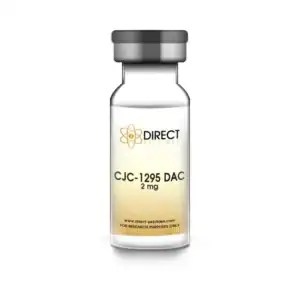Weight loss remains a significant challenge for many people across the world. Even with access to various resources and information, losing weight and keeping it off is still difficult for many individuals.
Traditional methods, such as eating a healthy diet and staying physically active, are important for success. However, these methods may not always give enough or satisfying results, especially for people with complex health issues or long-term obesity. This has led to the exploration of alternative approaches.
One such alternative that is drawing attention is the use of weight loss peptides. These are bioactive compounds gaining interest in scientific and medical studies. Although they are currently for research purposes only, their potential to help manage chronic obesity is creating excitement. Many researchers believe weight loss peptides could become a new and effective way to tackle the global obesity problem.
Weight loss peptides are amino acid chains that act as building blocks of proteins. These bioactive peptides interact with various biological processes, helping regulate metabolism, fat cells, and hormonal balance. By influencing these systems, weight loss peptides may aid in burning calories, reducing food intake, and promoting fat breakdown.
Weight loss peptides operate through a variety of mechanisms, each targeting specific aspects of the body’s metabolic and hormonal systems. One of their primary actions is to target fat cells directly, influencing their behavior and altering fat gene expression. This means that they can potentially change how the body stores and utilizes fat, making it easier to shed excess weight.
In addition to their impact on fat cells, these peptides may increase the body’s energy expenditure, which means burning more calories during both activity and rest. They are also believed to enhance the metabolic rate, helping the body convert food into energy more efficiently while preventing the accumulation of additional fat stores.
Another key benefit of weight loss peptides is their ability to regulate blood sugar levels. By stabilizing blood sugar, they reduce the likelihood of experiencing spikes and crashes that often lead to overeating or cravings for unhealthy, high-calorie foods.
Perhaps one of the most fascinating aspects of weight loss peptides is how they mimic the actions of natural hormones in the body. For example, certain peptides can act like satiety hormones, signaling the brain to reduce hunger and suppress appetite. At the same time, these compounds can boost fat-burning processes, allowing the body to break down stored fat and use it as a source of energy.
By addressing multiple facets of weight management—targeting fat cells, regulating metabolism, and influencing hormonal balance—weight loss peptides provide a multifaceted approach that has the potential to revolutionize the way obesity is treated. While more research is needed to fully understand their long-term safety and effectiveness, the early findings are undeniably exciting and point to a promising future in the field of weight management.
Peptide therapy is a growing area of interest in addressing obesity. This innovative approach uses bioactive peptides to target the root causes of metabolic syndrome. Metabolic syndrome is a complex condition that includes high blood pressure, elevated cholesterol, and significant weight gain. Although peptide therapy is still in the early stages of scientific study, research suggests it may play a key role in improving treatment approaches for such health concerns.
Scientists are studying various peptides, each with unique benefits and specific effects on weight and health management. Below are some of the most studied peptides:
 AOD-9604 is known for its ability to directly target stubborn fat cells. Indonesia Research suggests this peptide promotes fat loss without causing significant side effects.
AOD-9604 is known for its ability to directly target stubborn fat cells. Indonesia Research suggests this peptide promotes fat loss without causing significant side effects.
Its precision makes it a strong focus of scientific exploration. Clinical trials report promising results, showing its effectiveness in reducing body weight safely and in a targeted way.
Discover more on the AOD-9604 product page from Direct Peptides Indonesia.
CJC-1295 is another peptide under investigation for its role in protein synthesis and growth hormone release. Studies suggest it raises the metabolic rate and supports lean muscle growth.
Additionally, it helps improve recovery times and sleep quality, both critical for long-term weight control and overall health.
Learn more on the CJC-1295 product page from Direct Peptides Indonesia.
Melanotan II is often recognized for its skin-darkening effects, but studies suggest it also influences appetite and metabolism. Findings show it can suppress appetite and increase calorie burning.
However, its use must be approached with caution, as research links it to side effects such as nausea and headaches. Balancing its risks and benefits is crucial for further studies.
Find out more on the Melanotan II product page from Direct Peptides Indonesia.
Ipamorelin has been widely studied for its ability to boost growth hormone production.
Research shows it improves insulin sensitivity and lowers blood sugar levels, while also maintaining and building muscle mass.
These factors make it a potential tool for sustainable weight management and better physical health.
Explore details on the Ipamorelin product page from Direct Peptides Indonesia.
Tesamorelin has been studied for its ability to reduce abdominal fat, particularly in research involving conditions like HIV-associated lipodystrophy.
Studies report encouraging results, but side effects such as joint pain and flu-like symptoms are noted. These issues must be addressed to assess its overall effectiveness and safety.
Read about its benefits on the Tesamorelin product page from Direct Peptides.
Controlling blood sugar levels is very important for weight loss. Studies suggest that certain peptides, especially those known to improve insulin sensitivity, play a key role in keeping blood sugar stable.
This regulation supports weight management and helps prevent serious health issues, such as type 2 diabetes, which is often linked to obesity. Research shows that these peptides help the body use insulin more effectively. By doing so, they provide dual benefits for managing weight and improving overall metabolic health.
Maintaining a balanced metabolic rate is important for long-term weight management. Studies suggest that peptides help improve metabolic activity, allowing the body to burn calories more efficiently throughout the day. Peptides also help control how energy is used, making sure that calories are used for energy rather than stored as fat. This process helps with weight loss and supports energy balance. Research shows this approach could make it easier to maintain progress over time.
Explore Peptide Supplies at Direct Peptides for all your reconstitution requirements.
Clinical trials are critical for understanding and confirming the safety and effectiveness of weight loss peptides. These studies, often designed with control groups, are important for measuring the true effects of peptides on factors such as body mass index (BMI).
They also allow researchers to study how these compounds affect fat gene expression, energy use, and overall fat reduction. Results from these trials often show significant weight loss, highlighting the potential of peptides as effective weight loss drugs. Research suggests these findings point to a future where peptides could play a central role in strategies to treat obesity.
In recent years, research on peptides has grown quickly. Studies suggest that peptides may help manage obesity and improve metabolic health. Researchers are studying how peptides can support weight loss and provide broader health benefits. These benefits include improving metabolic functions and reducing risks linked to obesity. This growing research is opening doors to future innovations and offering hope for more effective obesity treatments.
While peptides show promise, studies suggest that more research is needed. Clinical trials give important data but need to be expanded to fully understand their safety and effectiveness. Researchers are focusing on key challenges, such as studying the long-term effects of peptides, finding the best ways to administer them, and managing side effects. Addressing these challenges is essential to using peptides as a safe and effective option for weight management and improving metabolic health.
Peptides, while showing great potential, do not work alone. Indonesia Research suggests that using only peptide therapy without other changes will not lead to lasting results. To make peptides more effective, studies recommend combining them with lifestyle changes.
These include eating a balanced diet, staying physically active, and managing stress through methods like mindfulness or relaxation exercises. Together, these strategies help with weight loss and improve overall physical and mental health.
For weight loss and peptide therapy, research shows that one approach does not work for everyone. Studies highlight the need to tailor plans based on unique health needs. This includes looking at health history, metabolic conditions, and long-term goals.
Addressing these factors helps researchers provide better insights and create plans that improve success rates. Considering these differences ensures that peptide-based treatments are both suitable and effective.
Metabolic syndrome is a major obstacle to effective weight loss. This condition includes factors such as high cholesterol, elevated blood pressure, and insulin resistance, all of which make weight management more difficult.
Research suggests that peptides affecting hormonal balance and fat gene expression show promise in managing the effects of metabolic syndrome. By addressing these issues, studies indicate that peptides can support more effective weight loss while improving overall metabolic health.
Losing muscle mass is a common challenge during weight loss and can harm overall health and metabolism. Research suggests that peptides such as CJC-1295 and Ipamorelin help solve this issue. These peptides are known to support the development and maintenance of lean muscle mass while the body sheds fat. This approach ensures that studies focus not only on fat loss but also on preserving or improving muscle mass, which is essential for long-term health.
Protein synthesis is a key process for building and recovering muscle. Peptides that enhance protein synthesis play an important role in weight loss efforts. Studies suggest these peptides promote muscle growth and improve recovery times, which help boost energy use and contribute to weight loss. By supporting muscle mass through better protein synthesis, these peptides improve strength and metabolic function, making long-term results more achievable.
The future of weight loss peptides shows great promise, but it must be approached with care. At present, many peptides are approved for research purposes only. Research suggests that more studies are needed to understand their long-term safety, risks, and benefits in treating obesity. These studies are critical to ensuring that peptide-based approaches are both safe and effective.
Studies emphasize that weight loss peptides work best when combined with proven lifestyle strategies. These strategies include following a balanced diet, staying physically active, and managing stress. Together, these elements create a comprehensive approach that improves the effectiveness of peptide therapies.
As research continues, new findings are revealing how peptides influence metabolism, regulate hormones, and support fat loss. This progress shows the potential for peptides to become key tools in managing obesity.
The dedication of researchers and healthcare professionals is paving the way for innovative treatments. Studies suggest that peptide therapies, combined with lifestyle changes, could improve weight management outcomes and overall health in the future.
Discover the full range of weight loss peptides available to buy for research by visiting our main site at Direct Peptides Indonesia.
[1] Ibrahim Abdalla MM. Ghrelin – Physiological Functions and Regulation. Eur Endocrinol. 2015 Aug;11(2):90-95.
[2] Heffernan MA, Thorburn AW, Fam B, Summers R, Conway-Campbell B, Waters MJ, Ng FM. Increase of fat oxidation and weight loss in obese mice caused by chronic treatment with human growth hormone or a modified C-terminal fragment. Int J Obes Relat Metab Disord. 2001 Oct;25(10):1442-9.
[3] Van Hout MC, Hearne E. Netnography of Female Use of the Synthetic Growth Hormone CJC-1295: Pulses and Potions. Subst Use Misuse. 2016 Jan 2;51(1):73-84.
[4] Côté I, Sakarya Y, Kirichenko N, Morgan D, Carter CS, Tümer N, Scarpace PJ. Activation of the central melanocortin system chronically reduces body mass without the necessity of long-term caloric restriction. Can J Physiol Pharmacol. 2017 Feb;95(2):206-214.
[5] Sinha DK, Balasubramanian A, Tatem AJ, Rivera-Mirabal J, Yu J, Kovac J, Pastuszak AW, Lipshultz LI. Beyond the androgen receptor: the role of growth hormone secretagogues in the modern management of body composition in hypogonadal males. Transl Androl Urol. 2020 Mar;9(Suppl 2):S149-S159.
[6] Fourman LT, Czerwonka N, Feldpausch MN, Weiss J, Mamputu JC, Falutz J, Morin J, Marsolais C, Stanley TL, Grinspoon SK. Visceral fat reduction with tesamorelin is associated with improved liver enzymes in HIV. AIDS. 2017 Oct 23;31(16):2253-2259.
Direct Peptides consistently updates its inventory with the latest peptides and compounds. Explore our New Arrivals section to discover what’s new.

Melanotan 2 Nasal Spray
£25.19 – £81.68Price range: £25.19 through £81.68 Select options This product has multiple variants. The options may be chosen on the product page
BULK BUY
Ipamorelin Peptide Vial
£12.38 – £77.15Price range: £12.38 through £77.15 Select options This product has multiple variants. The options may be chosen on the product page
TWIN PACKS
TWIN PACKS
TWIN PACKS
AOD-9604 Peptide Vial
£18.33 – £218.79Price range: £18.33 through £218.79 Select options This product has multiple variants. The options may be chosen on the product page
New Reduced Price
New Reduced Price
New Reduced Price
New Reduced Price
New Reduced Price
New Reduced Price
TWIN PACKS
CJC-1295 DAC
£24.20 – £159.26Price range: £24.20 through £159.26 Select options This product has multiple variants. The options may be chosen on the product pageALL CONTENT AND PRODUCT INFORMATION AVAILABLE ON THIS WEBSITE IS FOR EDUCATIONAL PURPOSES ONLY.
DISCLAIMER: These products are intended solely as a research chemical only. This classification allows for their use only for research development and laboratory studies. The information available on our Indonesia Direct Peptides website: https://direct-peptides.com is provided for educational purposes only. These products are not for human or animal use or consumption in any manner. Handling of these products should be limited to suitably qualified professionals. They are not to be classified as a drug, food, cosmetic, or medicinal product and must not be mislabelled or used as such.